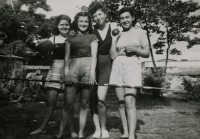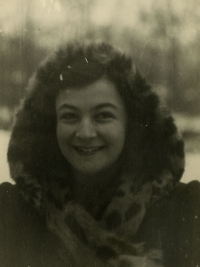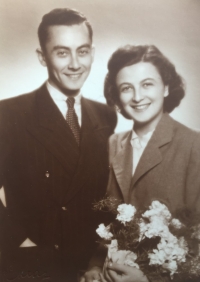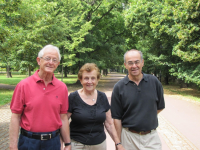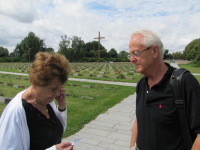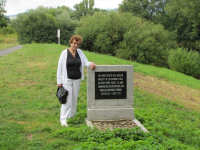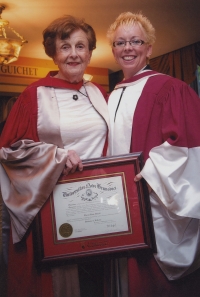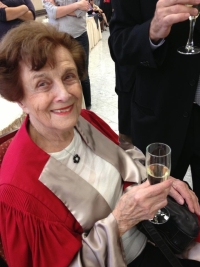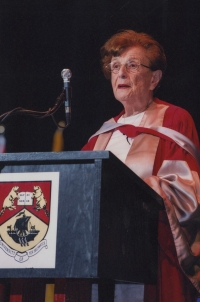"One night I was working and I hear footsteps. It was usual that he came from somewhere to check on his patient who had problems with intraocular pressure or whatever. So I didn't even wonder. But this night, when he came in, he was carrying something in his arms, a package, and he walked past me and said, 'Come on, Věra'. He went to the corner where we had some boxes, and he put the package there and said, 'Look, this is a newborn baby.' So I lifted up the blanket and saw a really pink newborn. So I was amazed and delighted. It seemed like a miracle. Because Terezín was a place where you always expected death, where you didn't expect life, new life. It was like something from another world. Now I see the child there, a normal child. Then Stein quickly said to me, 'Vera, cover it, the baby cannot live, because it was born tonight, but not officially.' Because when the woman came to Terezín and she was pregnant, she was marked 'SB', sonderbehandlung [special treatment], which meant the next transport to the gas. When a child was born, or a woman got pregnant in Terezín and didn't find out in time because the monthly bleeding stopped in Terezín, some women didn't find out they were pregnant until they were in their fifth or sixth month. Even then the doctor tried to abort it because the continuation was certain death to both of them. To the child and to the woman. When they managed to abort, the woman had a chance to survive. So that was the philosophy. And now this unfortunate newborn. I didn't ask any questions, and Stein says, "His mother is a friend of mine, and I don't want her to die. And he pulls a syringe out of his pocket and he's holding it in his hand and he says, 'Věra, this baby needs to be injected and it's over.' So I said, 'You're the head of the department.' And he says, 'You're going to do it!' I said, 'No no no, I don't know this lady and I'm not going to do this to her!' And to contradict Stein, that was very brave. Because he was very autocratic. The doctors in Terezín, it wasn't as democratic then as it is today, it was like a general in the field, you didn't contradict him. And I said, 'Doctor, I won't do it, I can't do it. Why don't you do it? That's your friend, not mine.' He says, 'Věra, you don't understand, I'm bound by the Hippocratic Oath, which commands the doctor to take care of life. Our whole career is about improving and sustaining life, and this is interrupting life.' So I thought he was crazy. Because we were in Terezín where death was multiplied at every corner and suddenly he's telling me about the Hippocratic Oath. I figured he must have gotten it mixed up in his head somehow. So we stood there looking at each other. I didn't want to, and he wasn't in the best mood anymore, apparently, that I was contradicting him. So he said, ‘Let's do it together!‘ He took the syringe, put it in my hand, linked his hand over mine, we pushed it down and he pushed the plunger. And the baby started crying. He put some kind of blanket over his mouth and then he threw some kind of rag over him and said, 'When the body snatching squad comes, make sure they take this. And it doesn't have a name. It never entered the Terezín statistics, because if it had, it would have gone to the gas chamber. But as long as it's anonymous and nobody knows she gave birth here, she has a chance of surviving.' I never found out who it was. And I didn't want to know. I didn't want to go and see a woman who I would have to say, 'Your baby had to die, maybe you'll have a chance to live.' But I know that the pink newborn a minute before suddenly started... She made a couple of these screams, started convulsing. And it died."



